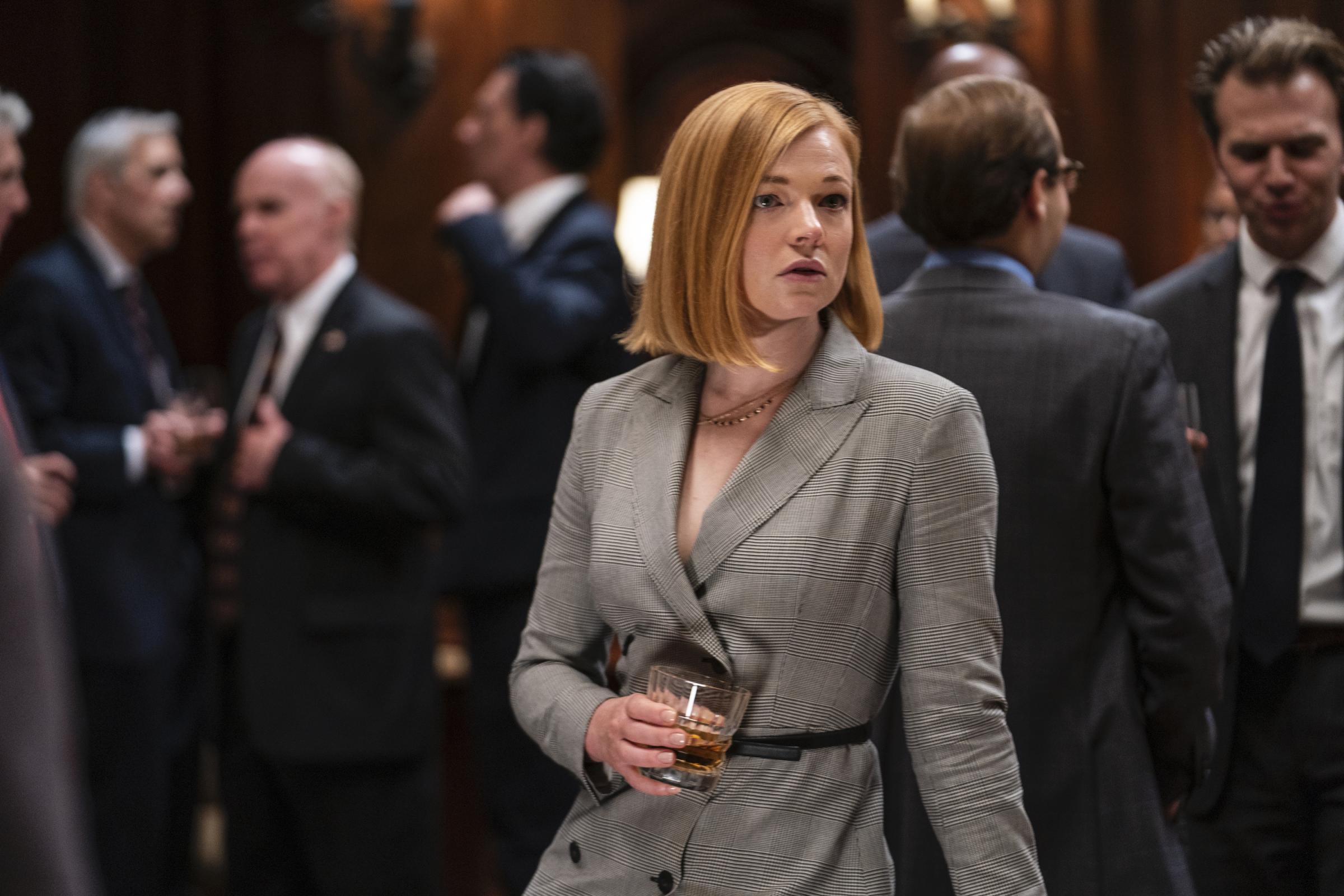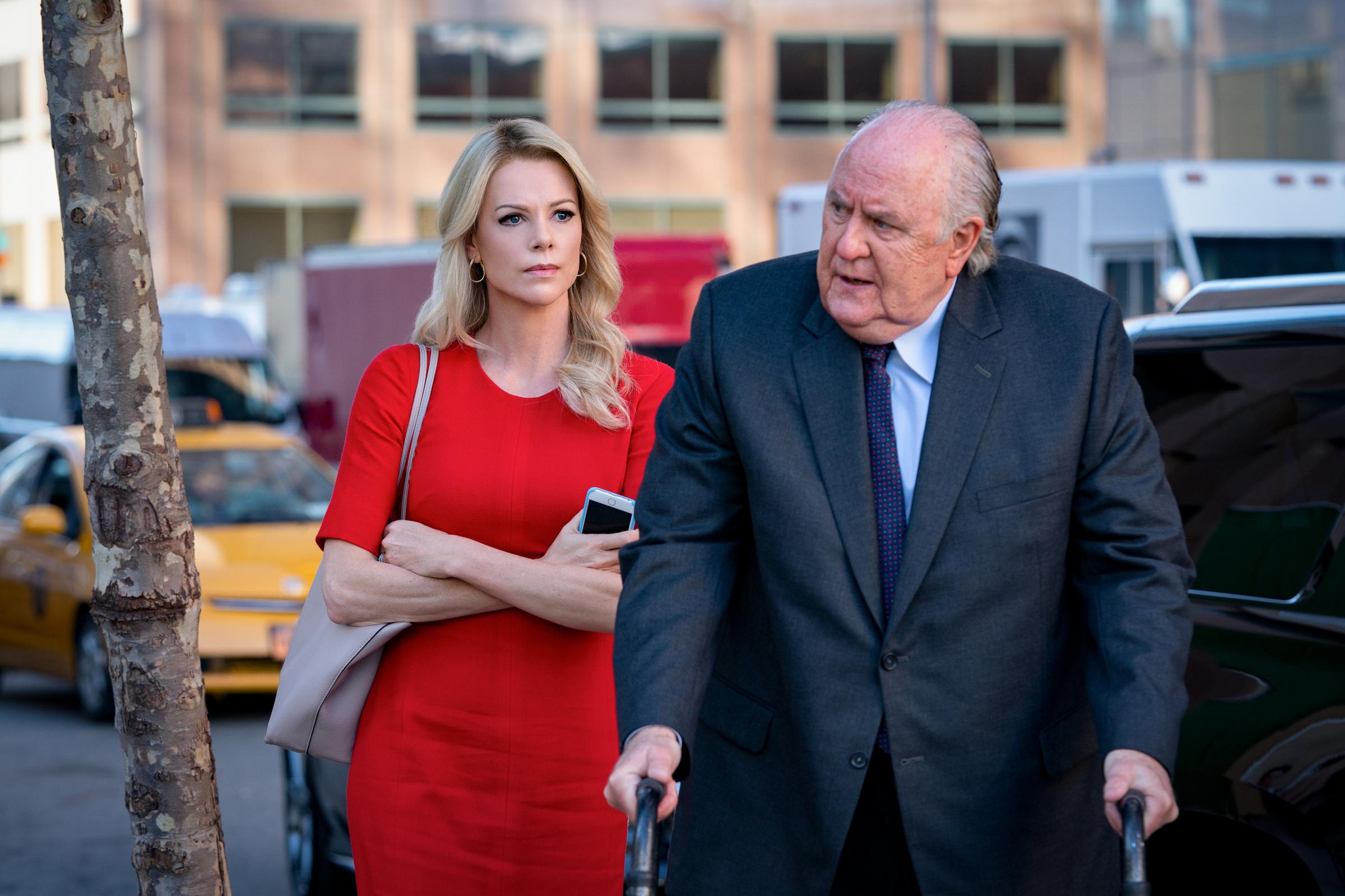Warning: This post contains spoilers for Bombshell, Succession and The Morning Show.
Megyn Kelly makes for a curious cinematic hero. She’s the nominal protagonist of Bombshell, the Big Short-style Oscar hopeful that retells the story of the Roger Ailes #MeToo scandal that plagued Fox News. Even though former Fox anchor Gretchen Carlson, who’s also depicted in the movie, was the woman who first sued Ailes for sexual harassment, Kelly was the big name that eventually brought heft to the dozens of accusations levied against the Fox CEO.
And yet—like all survivors—she’s imperfect. In fact, she’s made some major gaffes in the public eye. The year before the Fox scandal broke, she played, in turns, feminist hero—particularly in her face-off with Donald Trump on the debate stage—and a lightning rod for controversy. (The movie briefly nods at the black Santa debacle.) When Carlson’s lawsuit became fodder for gossip at Fox, Kelly refused to publicly support Ailes. But it also took her weeks to come forward to the law firm conducting an internal investigation with her own story of decade-old harassment. She was renegotiating her contract at Fox, and in the film, we see her (portrayed with chilling accuracy by doppelgänger Charlize Theron) weighing her options: Should she support her fellow women by helping to take down the man who has made her career, or betray her gender and prioritize her job?
Strikingly, the fictional Megyn Kelly is not the first powerful woman to face such a predicament in pop culture this year. She’s not even the first powerful woman working at a media conglomerate to face that decision onscreen. In HBO’s Succession, Shiv Roy (Sarah Snook), the daughter of a media mogul, must choose between silencing a victim of workplace sexual harassment or allowing the woman to testify before congress and possibly annihilate her family’s company—the company she wants to run someday—in the process. And on Apple TV+’s The Morning Show, Alex Levy (Jennifer Aniston) has to weather the fallout of a #MeToo scandal precipitated by her co-anchor, Mitch Kessler (Steve Carell). In the process, she must decide whether to take responsibility for her complicity in her co-anchor’s behavior, even if it means imperiling her own stardom. It’s not portrayed as much of a risk. As Mitch says to Alex late in the show, “The world is not ready to hold women accountable for their complicity, even the ones in power.” But it seems that filmmakers and showrunners are eager to have that conversation.
The topic of #MeToo is not new to film and TV. BoJack Horseman was tackling the issue of sexual abuse within the media industry before the hashtag ever trended. Jessica Jones, Tuca and Bertie and The Good Fight all reckoned with #MeToo either from the perspective of the accuser, the accused or allies. You’re the Worst and Veep showed women taking advantage of the movement against bad men to further their own careers, all to comedic effect. Catastrophe challenged a female character to reckon with her espoused values when she realizes that her husband might benefit from misogyny in the workplace.
But rarely have we seen women who stay silent about bad behavior forced to negotiate the current societal reckoning. It’s murkier territory: We know that harassers and abusers are bad, but what do we make of the women covering for them, especially if they’re doing so in hopes that they will continue on their own rise to power and eventually make a change to company culture and clean house? These movies and shows delve into the shades of gray, unlike so many conversations in the real world, and they do it to varying degrees of success.
Succession‘s Shiv is damned if she does, damned if she doesn’t

Siobhan (Shiv) Roy is arguably the most ethical character on Succession. Her father, a Rupert Murdoch type, has traded his morals for money. Her brothers are all grossly incompetent in their own ways, due to struggles with addiction (Kendall), immaturity (Roman) or pure egomania (Connor Roy 2020). Shiv, by contrast, is smart, efficient and a self-avowed bleeding-heart liberal. She cleans up the others’ messes and acts as the convenient, moral face of the company whenever a scandal breaks or the wooing of a Democrat is needed.
But that means that when she chooses to compromise her supposed principles in order to stay loyal to her father, she comes off as even more villainous than her amoral, power-hungry siblings. Shiv stans were forced to question their fandom in the second season of Succession when her father’s company faces accusations of a sexual harassment cover-up in the cruise devision. In the penultimate episode, Shiv’s father dispatches her to convince one of the victims, Kira (Sally Murphy), not to testify in front of congress.
As Shiv arrives at the playground where the victim is watching her son, Shiv is offered an out from this unenviable task by the company’s CEO Rhea (Holly Hunter). “You don’t have to do this,” she tells Shiv.
“If she speaks and she’s compelling, then that’s it for my family’s company. So yeah, I do have to,” Shiv shoots back. Shiv’s motives finally become clear: She’s willing to sacrifice everything for family and status.
What follows is a masterfully written scene that showcases just how smart—and scummy—Shiv can actually be. She removes her heels to literally meet Kira on her level and nods at their shared pain as women. Rather than lying to this victim, she tells her the truth—that Shiv’s father is untrustworthy and that Shiv is self-interested. But she also lays out some harsh truths about what it means to speak out about sexual harassment and assault, even today.
“You’re going to have a lot of people on your side who will sing your name and back you up. But the other people? The other side? Normal people?…They’ll call you a slut and a whore and a money-grubber…From tomorrow that’s all you’ll ever be, to your grandkids, to people you meet on vacation. When they Google you, pages and pages of filth and lies. First line of your obituary, last line.”
Shiv offers an alternative: Work with her internally. She summons righteous anger: “I will destroy the men who ran that dirty operation. I will kill them for what they’ve done. And I want you to help me.”
When the woman responds, “Can I trust you?” Shiv again deploys honesty in service of a greater lie: “Frankly, I want what’s best for me. But the other people? The folks who want you to get up there tomorrow and get pulled apart? They want what’s best for them. You have to think about what’s best for you.”
What’s insidious about Shiv’s speech is that everything she says is true. The episode aired on the one-year anniversary of Christine Blasey Ford’s testimony about Brett Kavanaugh, driving home the point that sometimes, even when a woman bravely stands up and faces the man she accuses in public, nothing changes, at least not right away. And it’s almost certainly true that Shiv, if and when she does take over, does indeed want to shake up the system and clean house. Whether that will happen, and whether she will be totally compromised by the time she gets to the top, is a question for another day.
What’s truly brilliant and sick about Succession is that even after a horrific scene in which Shiv compromises herself as a woman, a feminist and a human, it still feels natural to root for her. Between her and her father, she is the lesser of two evils. That urge to pull for her reveals something unsettling about what we have come to expect of our female champions, and perhaps even of our own compromised visions of the world.
The Morning Show presents a woman as culpable but not irredeemable

The Morning Show is eager to plumb the depths of the #MeToo movement for complicated conversations. (Whether it succeeds is up for debate.) Jennifer Aniston is trying her darnedest to shed her long-held “America’s sweetheart” title with a character that is occasionally loathsome yet still somehow lovable. Her most despicable trait is her loyalty to her former co-host, a man she knew was flawed, and maybe even knew was a rapist. She looked the other way. She did worse. And even once he’s been publicly shamed, she continues to meet with him, to support him and occasionally try to exploit him to her own advantage.
During one such meeting, Mitch accuses Alex of being aware of—and perhaps even supporting—his behavior. She looks aghast. Whether this is play-acting or genuine surprise is unclear. He lays out the evidence.
“Are you going to keep pretending you didn’t know what was going on?” he asks. “Are you actually going to look me in the eye and say you didn’t participate?…You didn’t roll your eyes at these women? You didn’t make jokes at their expense? You didn’t mock their sometimes desperate behavior when I moved on? I may have f-cked them, but you were very cruel. And words matter.”
Mitch, of course, has his own agenda: To take down everyone he can with him. And equating rape with mockery is unfair. It’s the sort of delusional, egotistical argument that definitively places Mitch in the category of “bad men.” Still, it certainly awakens a sense of guilt in Alex, one that comes to a head when—in a strangely dramatic turn for the show—one of Mitch’s survivors takes her own life. It’s then that Alex, along with her cohost Bradley Jackson (Reese Witherspoon), decides to reveal, live on national television, that the head of the network not only knew of Mitch’s behavior but enabled it. During that speech, Alex says that the network covered up a toxic culture and that she is guilty of aiding them in that effort.
As with Shiv, Alex’s motives are dubious. Yes, she’s upset by the death of a colleague. And yes, the revelation that the network boss allowed women to be hurt seems to push her to the breaking point. But she is also a woman desperate to control the narrative of a breaking scandal that implicates her as an accessory. Unfortunately, The Morning Show can’t fully commit to these shades of gray.
“I’m as culpable as anyone in terms of not calling out or not helping to end the sexual misconduct that goes on in this f-cking building” she says on air. The admission is set to swelling, heroic music situating Alex as a brave silence breaker rather than—more cynically speaking—a master media manipulator.
The scene parallels the opening episode, in which Alex was forced to announce the firing of Mitch alone on television, a not-so-subtle recreation of Savannah Guthrie and Hoda Kotb responding to similar news about Matt Lauer. The contrast between the moments—in the first, Alex is composed and rehearsed, and in the second she’s sobbing and dropping f-bombs—also forces the viewer to question how contrived the real-life versions of such announcements may be, and whether we can untangle the emotions that the women who sat beside the bad men are actually feeling from the ones they present to the world.
Bombshell invents a fictional character to suffer the consequences of a real woman’s silence

Bombshell offers perhaps the most realistic portrayal of a woman navigating a #MeToo storm created by a colleague or boss. It is based on real life, after all. In scenes leading up to Megyn Kelly’s decision to share her own experiences with Roger Ailes (John Lithgow), her team begs her to stay silent. They have children to feed, school to pay for. Even if Megyn’s fame saves her from the backlash, her speaking out might destroy their careers.
It turns out that Megyn has long justified her silence by imagining that Roger can’t possibly still be harassing women: After all, he tried to come on to her—and grew angry with her when she rejected him—a decade ago. But she hears through the rumor mill that women who work at Fox now are still experiencing his lechery. She spots an aspiring reporter named Kayla (a fictional character played by Margot Robbie) headed into Ailes’ office and decides to visit her desk later to suss out whether any inappropriate behavior is taking place. It’s the one time anyone in the movie really confronts Megyn with her own role in perpetuating the toxic environment at Fox.
“Why didn’t you say anything?” Kayla asks, arguing that if Megyn had exposed Ailes years before, she would have saved Kayla and dozens like her from suffering at his hands. Megyn shoots back that she didn’t have the power to take on Ailes then, that she would have been fired. “How do you think I got to where I am?”
“Oh, so you slept with him?” Kayla asks. Megyn exclaims, “Oh my God” and stalks away, never actually answering Kayla’s question. The question implies that that’s the expectation for women like Kayla, for all the women at Fox News—and that everyone knows it. Megyn is insulted by Kayla’s implication, yes, but she’s also exasperated with the attitude at Fox News in general. Things are worse than she suspected, and by treating Ailes as a mentor figure and lionizing him since their own incident years before, she’s helped allow that culture to become the norm.
Megyn is, of course, based on a real person, unlike Alex Levy or Shiv Roy, and Bombshell admirably holds her to account. But it’s notable that she must have the discussion about her own guilt with a fictional character—the film and perhaps we as an audience aren’t quite ready to see two real women have that uncomfortable and even accusatory conversation. Megyn is forced to consider the consequences of her silence, yes, but those consequences—in this movie—are suffered by a fictional woman. If a real woman had confronted her, it would be difficult for the movie to position Megyn in even a vaguely heroic light.
Offscreen, we’re still figuring out how to have these discussions in ways that move us forward collectively. These shows and films don’t give us easy answers, but more and more, they give us new language to ask the questions.
More Must-Reads From TIME
- The 100 Most Influential People of 2024
- Coco Gauff Is Playing for Herself Now
- Scenes From Pro-Palestinian Encampments Across U.S. Universities
- 6 Compliments That Land Every Time
- If You're Dating Right Now , You're Brave: Column
- The AI That Could Heal a Divided Internet
- Fallout Is a Brilliant Model for the Future of Video Game Adaptations
- Want Weekly Recs on What to Watch, Read, and More? Sign Up for Worth Your Time
Write to Eliana Dockterman at eliana.dockterman@time.com